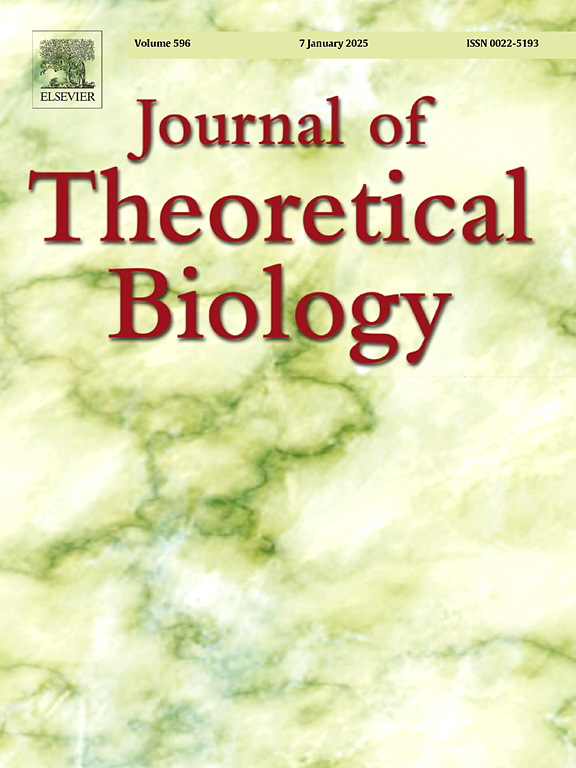From Bayes to Darwin: Evolutionary search as an exaptation from sampling-based Bayesian inference
IF 1.9
4区 数学
Q2 BIOLOGY
引用次数: 0
Abstract
Building on the algorithmic equivalence between finite population replicator dynamics and particle filtering based approximation of Bayesian inference, we design a computational model to demonstrate the emergence of Darwinian evolution over representational units when collectives of units are selected to infer statistics of high-dimensional combinatorial environments. The non-Darwinian starting point is two units undergoing a few cycles of noisy, selection-dependent information transmission, corresponding to a serial (one comparison per cycle), non-cumulative process without heredity. Selection for accurate Bayesian inference at the collective level induces an adaptive path to the emergence of Darwinian evolution within the collectives, capable of maintaining and iteratively improving upon complex combinatorial information. When collectives are themselves Darwinian, this mechanism amounts to a top-down (filial) transition in individuality. We suggest that such a selection mechanism can explain the hypothesized emergence of fast timescale Darwinian dynamics over a population of neural representations within animal and human brains, endowing them with combinatorial planning capabilities. Further possible physical implementations include prebiotic collectives of non-replicating molecules and reinforcement learning agents with parallel policy search.
从贝叶斯到达尔文:从基于抽样的贝叶斯推理的进化搜索。
基于有限种群复制因子动力学和基于贝叶斯推理的粒子滤波近似之间的算法等价,我们设计了一个计算模型,以证明当选择单位集体来推断高维组合环境的统计数据时,达尔文进化在代表性单位上的出现。非达尔文主义的起点是两个单位经历了几个有噪声的、依赖于选择的信息传递周期,对应于一个序列(每个周期一个比较),没有遗传的非累积过程。在集体水平上对精确贝叶斯推理的选择诱导了一条适应路径,从而在集体中出现达尔文进化,能够维持和迭代地改进复杂的组合信息。当集体主义本身是达尔文主义时,这种机制相当于个体自上而下(孝顺)的过渡。我们认为,这种选择机制可以解释动物和人类大脑中神经表征群体中快速时间尺度达尔文动力学的假设出现,赋予它们组合规划能力。进一步可能的物理实现包括非复制分子的益生元集体和具有并行策略搜索的强化学习代理。
本文章由计算机程序翻译,如有差异,请以英文原文为准。
求助全文
约1分钟内获得全文
求助全文
来源期刊
CiteScore
4.20
自引率
5.00%
发文量
218
审稿时长
51 days
期刊介绍:
The Journal of Theoretical Biology is the leading forum for theoretical perspectives that give insight into biological processes. It covers a very wide range of topics and is of interest to biologists in many areas of research, including:
• Brain and Neuroscience
• Cancer Growth and Treatment
• Cell Biology
• Developmental Biology
• Ecology
• Evolution
• Immunology,
• Infectious and non-infectious Diseases,
• Mathematical, Computational, Biophysical and Statistical Modeling
• Microbiology, Molecular Biology, and Biochemistry
• Networks and Complex Systems
• Physiology
• Pharmacodynamics
• Animal Behavior and Game Theory
Acceptable papers are those that bear significant importance on the biology per se being presented, and not on the mathematical analysis. Papers that include some data or experimental material bearing on theory will be considered, including those that contain comparative study, statistical data analysis, mathematical proof, computer simulations, experiments, field observations, or even philosophical arguments, which are all methods to support or reject theoretical ideas. However, there should be a concerted effort to make papers intelligible to biologists in the chosen field.

 求助内容:
求助内容: 应助结果提醒方式:
应助结果提醒方式:


